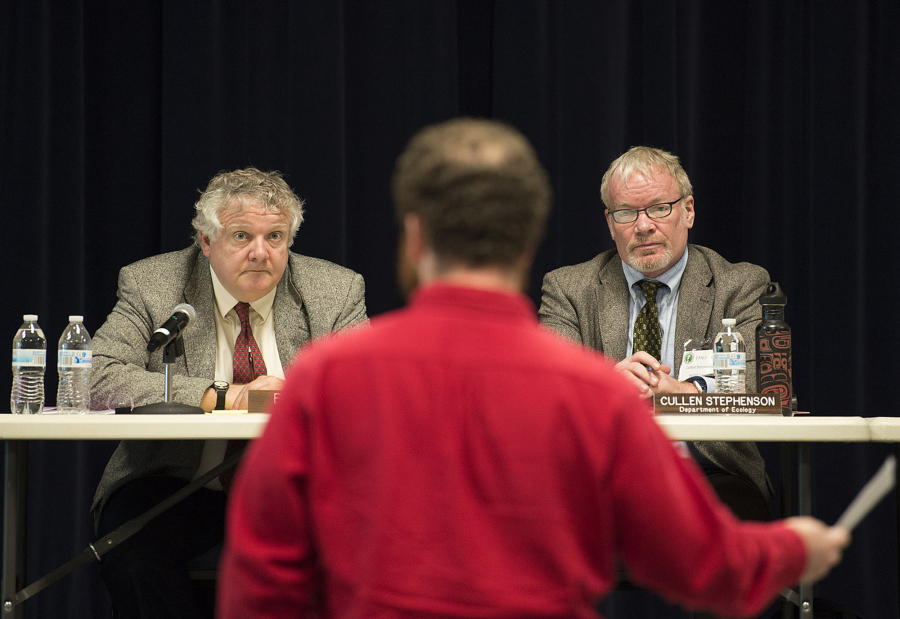State officials have again pushed back the decision deadline for the Vancouver Energy rail-to-marine oil terminal proposed for the Port of Vancouver.
During its regular meeting in Olympia on Tuesday, the Energy Facility Site Evaluation Council granted Vancouver Energy’s request to extend the application deadline until Nov. 30. It is the seventh extension granted in the evaluation process.
The additional extension came just before the evaluation council’s chair, Bill Lynch, added a new twist in the project’s storyline by announcing his intention to resign in the fall. Lynch was appointed by Gov. Jay Inslee at the beginning of Vancouver Energy’s application hearing process.
It’s unclear what, if any, impact his decision may have on the project’s evaluation, but it has raised eyebrows for people watching the process closely.
Tara Lee, a spokeswoman for the governor’s office, said it was made aware of his intent to step down but hasn’t yet received his resignation letter.
“Hopefully we will know the specifics of when he will step down, when we receive the letter. And, we won’t know what kind of transitions will take place afterwards without knowing when he plans to leave,” Lee said in an email. “The plan to replace him follows our procedure for new appointments and goes through the governor’s boards and commissions office, with input from our policy staff and stakeholders.”
Lynch did not return calls seeking comment Tuesday.
State law dictates an energy project’s evaluation be completed and a recommendation given to the governor within a year of it coming before the council. But the Vancouver Energy terminal process started in late 2013.
“The extensions are part of the process,” said Jared Larrabee, general manager for Vancouver Energy. “Pursuant to EFSEC regulations, and as the applicant for the Vancouver Energy project, we are required to request any necessary extensions to allow EFSEC adequate time to review our application. We have complied with this requirement at each instance in which EFSEC has required additional time to complete its review.”
If approved, the $210 million terminal would process an average of 360,000 barrels of oil per day. The oil would be shipped from the Midwest on approximately four crude oil unit trains per day. It would be stored at the terminal and transferred to marine vessels in the Columbia River, destined for refineries along the West Coast.
Dan Serres, conservation director for Columbia Riverkeeper, argued the extension delays what should ultimately be a rejection of the proposal.
“We think the decision for this council is obvious: The project is dangerous and inappropriate,” he said. “The delay increases the likelihood that the Port of Vancouver will have a decision-making role regardless of what (the evaluation council) does.”
The extension means that voters might decide on a new Port of Vancouver District 1 commissioner before EFSEC makes its decision on the terminal.
The current port commission has previously voted 2-1 to allow the project to continue forward. But the swing vote, District 1 Commissioner Brian Wolfe, isn’t running for election again.
The two candidates for his seat have differing views on the project. Don Orange is starkly against it. Kris Greene is supportive with the stipulation that it is done safely.
The evaluation council acts as a sort of clearinghouse for proposed large energy projects within the state. It holds a quasi-judicial hearing to weigh potential benefits and detriments of building a project, drafts and evaluates needed permits and writes final environmental impact statements.
Based on that information, the evaluation council will make a recommendation to the governor, who has the ultimate say on whether the project can be built. After the council is finished with its work, the governor has 60 days to make a decision.
The Vancouver Energy proposal is the only one the council is currently working on. It has one more permit to work through and is still completing the final environmental impact statement.
“As for the final (environmental impact statement), the final draft is close to completion,” said Amanda Maxwell, spokeswoman for the council. “That should be close to done (with only minor changes) and delivered to the council in September to inform their decision-making process.”
The council will host a public meeting in Vancouver to allow the public to comment on the project’s industrial stormwater permit on Aug. 22 — the final day of the permit’s public comment period.




